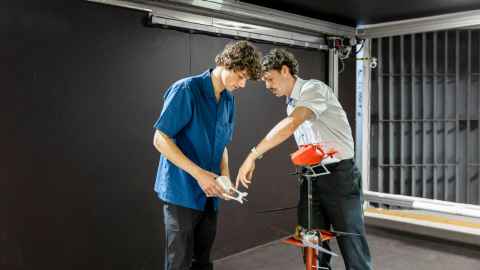Samuel Gordon and Thomas Phillips
From building Lego aeroplanes as kids to now optimising drone aerodynamics for Swiss manufacturer ANAVIA, Samuel Gordon and Thomas Phillips have turned their fascination with how things work into a promising path in engineering.
Programme: Bachelor of Engineering (Honours)
Specialisation: Mechanical Engineering
Final Year Project: Optimising drone aerodynamics for Swiss manufacturer ANAVIA
As kids, Samuel Gordon and Thomas Phillips similarly both loved building Lego and were always interested in how things worked in the world around them. Their shared passion and curiosity translated into the two now studying Mechanical Engineering at the University of Auckland – what they believe was the logical decision to make.
Samuel and Thomas are now working together on their Final Year Project, which involves research using CFD (computational fluid dynamics) analysis and testing at the Faculty of Engineering and Design's Wind Tunnel, to optimise the aerodynamics of a UAV (unmanned aerial vehicle) for their sponsor company, ANAVIA. This project gives them the chance to develop a solution to a real-world problem by applying the knowledge and skills they've gained – similar to how they might approach the problem in their professional career.

Could you tell us about your Final Year Project and what inspired it?
"We initially found out about this project through our supervisor, and it was something that Sam and I were really excited about because it combined areas that we're passionate in, such as aerodynamics, manufacturing, 3D-printing," says Thomas.
“ANAVIA set us objectives at the beginning of the project to optimise their HT-100 UAV in a way that helps it perform to a higher standard", adds Samuel, who is also completing a Bachelor of Commerce in Finance and Business Analytics alongside his Bachelor of Engineering (Honours) degree.
"We're going to look into how much force is actually produced on the drone using different wind speeds, as well as obtain a more comprehensive result on the forces at different angles of attack of the drone."'
“Through our research, we plan to gain insights into the drag, aerodynamic characteristics, crosswind sensitivity, and stability of the UAV model”, adds Thomas.
“The HT-100 UAV has a wide range of applications at the moment. It’s currently being used for aerial mapping, reconnaissance, and search and rescue, for multiple different fields", says Samuel.
With our research, we hope to improve the technology of the UAV, so that ANAVIA can provide greater solutions to their customers and the needs that they might have in their industry.
What are some of your key takeaways from working on this project?
“We've been able to access greater expertise on the subjects that we're doing now. We're working with engineers from both within the faculty and at ANAVIA, who’ve been in the field for 10 to 20 years," says Samuel.
"The ability to utilise what they know with regards to wind tunnel testing and CFD analysis, and areas around that, has allowed us to streamline the process, speed it up and get better results in a shorter timeframe."
“This project is in a field I am particularly passionate about, and the skills I’m developing through the project will be essential for any future jobs in this area. As a graduate, I plan on using these skills as a foundation for further development in becoming a better engineer and in helping to aid my professional pursuits in the field," says Thomas.
“I believe that the experience and knowledge that I’m gaining from completing my Final Year Project will be invaluable in my career beyond university. Many of the top engineering firms and consultancies across the world heavily consider these projects as part of their recruiting process, and completing these projects to a high level helps tremendously in this process”, adds Samuel.
“Having ANAVIA as an industry sponsor to this project creates an extra layer of complexity to the project which has been thoroughly enjoyable. As a graduate, the skills in communication and reporting that I’ve developed through this project will help me to better communicate with clients if I choose to work in a consultancy, and with my employer and colleagues overall”.
“Engineering is difficult and it's highly demanding, but the results are truly rewarding. To anyone considering studying engineering, I'd say dive right in”.
Find out more about the programme structure, entry requirements, fees, and key dates for the Bachelor of Engineering (Honours).